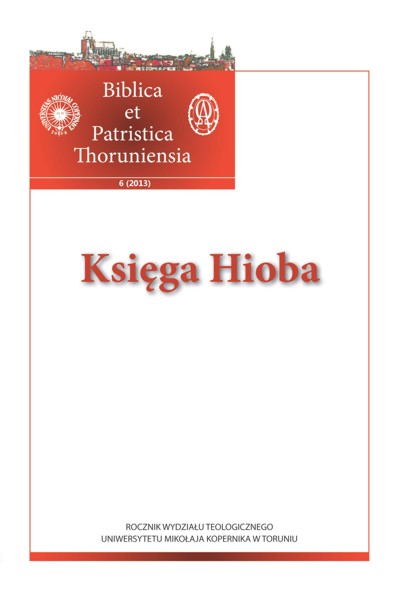Żyć w cieniu pytań. Antropologiczne przesłanie Expositio super Iob św. Tomasza z Akwinu
DOI:
https://doi.org/10.12775/BPTh.2013.007Schlagworte
Tomasz z Akwinu, egzegeza średniowieczna, opatrzność, dysputy, cierpienie, szczęścieAbstract
W bogatej aktywności komentatorskiej Tomasza z Akwinu od wielu lat uwagę badaczy zwraca egzegeza księgi Hioba, wyróżniająca się zarówno stylem jak i treścią od pozostałych komentarzy. Określany już w swym tytule jako komentarz ad litteram, nie skupia się jedynie na wątkach duchowych (podejmowanych przez Grzegorza Wielkiego w Moralia in Iob i przez Tomasza podzielanych), lecz na interpretacji tajemnicy Opatrzności Bożej, która przekłada się na szereg zagadnień metafizycznych (relacja Boga do świata, Jego znajomość poszczególnych jednostek) czy soteriologicznych o istotnym znaczeniu dla chrześcijańskiej wiary i samej teologii. Tomasz odczytuje tę biblijną księgę jako swoistą dysputę (disputatio), w której myślenie Hioba zostaje przeobrażone: od zmysłowego, przez racjonalne aż po uległe natchnieniu Bożemu. Zmiana dokonuje się na drodze stawiania pytań i prób, stanowiących słowa klucze i kryterium niniejszego artykułu. Tym samym Tomasz szkicuje niejako antropologię pisaną z perspektywy cierpienia, doświadczeń i prób, a z drugiej strony na tej kanwie przekazuje inspirujące myśli dla teologii rozumianej przecież w jego czasach jako sacra doctrina, w całej palecie zagadnień i kwestii dotyczących relacji człowieka z Bogiem (przecież w projekcie Tomaszowym teologia rozważa wszystko sub ratione Dei). Teologia sytuuje się w dynamizmie tego noszenia pytań i oświetlania ich mocą revelatio, która odsłania cel ostateczny człowieka, ale czyni to wcielając niejako w egzystencję, w jej konkretne kształty.Literaturhinweise
Ausin S., La providencia divina en el libro de Job (Estudio sobre la ‘Expositio in Iob’ de Santo Tomás de Aquino), Scripta Theologica 8 (1976), s. 477–550.
Brueggemann W., The Costly Loss of Lament, Journal for the Study of the Old Testament 36 (1986), s. 57–71.
Chardonnens D., L’homme sous le regard de la Providence, J. Vrin, Paris 1997.
Gałuszka T., Badania nad Biblią w XIII wieku. Super Psalmum XXIII, Homini, Kraków 2005.
Grabowski M., Pomazaniec. Przyczynek do chrystologii filozoficznej, W drodze, Poznań 2011.
Guardini R., El ocaso de la edad moderna, w: Obras, vol. 1, Ediciones Cristiandad, Madrid 1981.
Kostelecky M., Thomas Aquinas’s «Summa contra gentiles»: a mirror of human nature, Peeters, Lovain 2013.
Le Goff J., Człowiek średniowiecza, Oficyna Wydawnicza Volumen, Warszawa–Gdańsk 1996.
Leget C., Living with God. Thomas Aquinas on the Relation between Life on Earth and ‘Life’ after Death, Peeters, Louvain 1997.
Levering M., Ordering Wisdom. Aquinas, the Old Testament and Sacra Doctrina, w: R. Hutter, M. Levering, Ressourcement Thomism. Sacred Doctrine, the Sacraments and the Moral Life, Catholic University of America Press, Washington 2010.
Manzanedo M., La antropología teológica en el comentario tomista al libro de Job, Angelicum 2 (1987), s. 301–331.
Mróz M., Roszak P., Perfectus secundum intellectum et affectum. Ideał egzegety i jego pracy komentatorskiej wg Tomasza z Akwinu, Teologia i Człowiek 10 (2007), s. 113–130.
Nutt R. W., Providence, Wisdom, and the Justice of Job’s Afflictions: Considerations from Aquinas’ Literal Exposition on Job, Heythrop Journal 1 (2011), s. 1–23.
Saranyana J. I., ¿Por qué sufren los buenos y triunfan los malos?: comentario literal de Tomás de Aquino al Libro de Job (capítulos 1–3), Servicio de Publicaciones de la Universidad de Navarra, Pamplona 2010.
Urs von Balthasar H., Patristik, Scholastik und Wir, Teologie der Zeit 2 (1939), s. 65–104.
Woźniak R. J., Różnica i tajemnica. Objawienie jako teologiczne źródło ludzkiej sobości, W drodze, Poznań 2012.
Yaffe M. D., Providence in Medieval Aristotelism: Moses Maimonides and Thomas Aquinas on the Book of Job, Hebrew Studies 20–21 (1979–1980), s. 62–74.
Yocum J., Aquinas‘s Literal Exposition on Job, w: T. Weinandy, D. Keating, J. Yocum (red.), Aquinas on Scripture. An introduction to His Biblical Commentaries, T&T Clark, London 2005.
Zerafa P., Il commento di San Tommaso al libro di Giobbe tra esegesi antica e esegesi contemporánea, Angelicum 71 (1994), s. 461–507.
Downloads
Veröffentlicht
Zitationsvorschlag
Ausgabe
Rubrik
Lizenz
CC BY ND 4.0. Posiadaczem prawa autorskiego (Licencjodawcą) jest Autor, który na mocy umowy licencyjnej udziela nieodpłatnie prawa do eksploatacji dzieła na polach wskazanych w umowie.
- Licencjodawca udziela Licencjobiorcy licencji niewyłącznej na korzystanie z Utworu/przedmiotu prawa pokrewnego w następujących polach eksploatacji: a) utrwalanie Utworu/przedmiotu prawa pokrewnego; b) reprodukowanie (zwielokrotnienie) Utworu/przedmiotu prawa pokrewnego drukiem i techniką cyfrową (e-book, audiobook); c) wprowadzania do obrotu egzemplarzy zwielokrotnionego Utworu/przedmiotu prawa pokrewnego; d) wprowadzenie Utworu/przedmiotu prawa pokrewnego do pamięci komputera; e) rozpowszechnianie utworu w wersji elektronicznej w formule open access na licencji Creative Commons (CC BY-ND 3.0) poprzez platformę cyfrową Wydawnictwa Naukowego UMK oraz repozytorium UMK.
- Korzystanie przez Licencjobiorcę z utrwalonego Utworu ww. polach nie jest ograniczone czasowo ilościowo i terytorialnie.
- Licencjodawca udziela Licencjobiorcy licencji do Utworu/przedmiotu prawa pokrewnego nieodpłatnie na czas nieokreślony
PEŁEN TEKST UMOWY LICENCYJNEJ >>
Stats
Number of views and downloads: 610
Number of citations: 0



